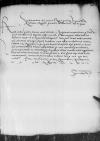List #2674
Sigismund I Jagiellon do Ioannes DANTISCUSWielowieś, 1543-11-01
| odebrano Heilsberg (Lidzbark Warmiński), 1543-11-11 Rękopiśmienne podstawy źródłowe:
| ||||
Tekst + aparat krytyczny + komentarz Zwykły tekst Tekst + komentarz Tekst + aparat krytyczny
 BCz, 1601, p. 488
BCz, 1601, p. 488 Reverendo in Christo Patri, domino
Reverende in Christo Pater, sincere nobis dilecte.
Accipimus excusationem Paternitatis Vestrae, quod mandata nostra exsecuta
adhuc non sit et moram hanc illius boni consulimus. Modo ut ne longiorem interponat, nam post semel missa mandata nostra diversum deinceps aliquid decernere non esse gravitatis nostrae videtur. Cetera ex <litteris> reverendi in Christo patris, domini
Quae bene valeat.
Ex
Ex commissione propria regiae maiestatis

